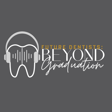
Mental Fortitude
About the Hosts:
Dr. Savanah Craig is a practicing dentist who is passionate about sharing her journey and experiences as she navigates the early years of her dental career. With a commitment to patient care and dental education, Dr. Craig is an advocate for resilience and adaptability in the field of dentistry.
Dr. Ronnetta Sartor is a seasoned dentist with years of experience in the field. With a deep understanding of patient care and dental practices, she brings a wealth of knowledge and empathy to her profession. Dr. Sartor is dedicated to mentoring new dentists and fostering a supportive environment for colleagues to thrive.
Episode Summary:
In this insightful episode of "Beyond Graduation," Dr. Savanah Craig and Dr. Ronnetta Sartor delve into the crucial topic of mental toughness in dentistry. From handling patient anxieties to managing expectations, they discuss the multifaceted challenges that dental professionals face and the resilience required to navigate them. Dr. Sartor emphasizes that dentists often encounter initial negative perceptions, stating, "It's hard when someone hates you and they haven't even met you yet just based on what you do for a living."
Throughout the episode, Dr. Craig and Dr. Sartor exchange their own strategies for developing mental toughness, including maintaining a sense of humor and giving oneself grace. They highlight the importance of having candid conversations with patients about the realistic outcomes and necessary upkeep of dental treatments. Dr. Sartor notes, "There's nothing that I can do that's going to not have any risks. Every treatment option will have risks and benefits." Incorporating these practices helps manage patient expectations and fosters more successful treatment outcomes.
Key Takeaways:
- Developing Mental Toughness: Dentists must build resilience to handle negative perceptions and challenging patient interactions effectively.
- Importance of Communication: Clear, thorough communication with patients is critical for setting realistic expectations and preventing misunderstandings.
- Continuous Learning: Keeping up with the latest research a
- Balancing Humility and Expertise: Dentists should acknowledge the limits of current dental materials and techniques while striving to provide the best care available.
- Team Support: A cohesive, supportive team is essential for maintaining a positive environment and delivering exceptional patient care.
Connect with Us:
- Savanah Craig, DDS: @savanahcraigdds
- Ronnetta Sartor, DMD: @dr_sartor
- FutureDentists Beyond Graduation: @futuredentistsbeyondgraduation
- Dental Residency Guide and Beyond Graduation eBooks: https://ignitedds.com/subscription-resources/
In this engaging episode, Dr. Savanah Craig and Dr. Ronnetta Sartor offer valuable insights into the mental resilience required for a successful dental career. Their candid discussion on patient relationships and personal growth is a must-listen for all dental professionals. Stay tuned for more enlightening conversations on "Beyond Graduation."



